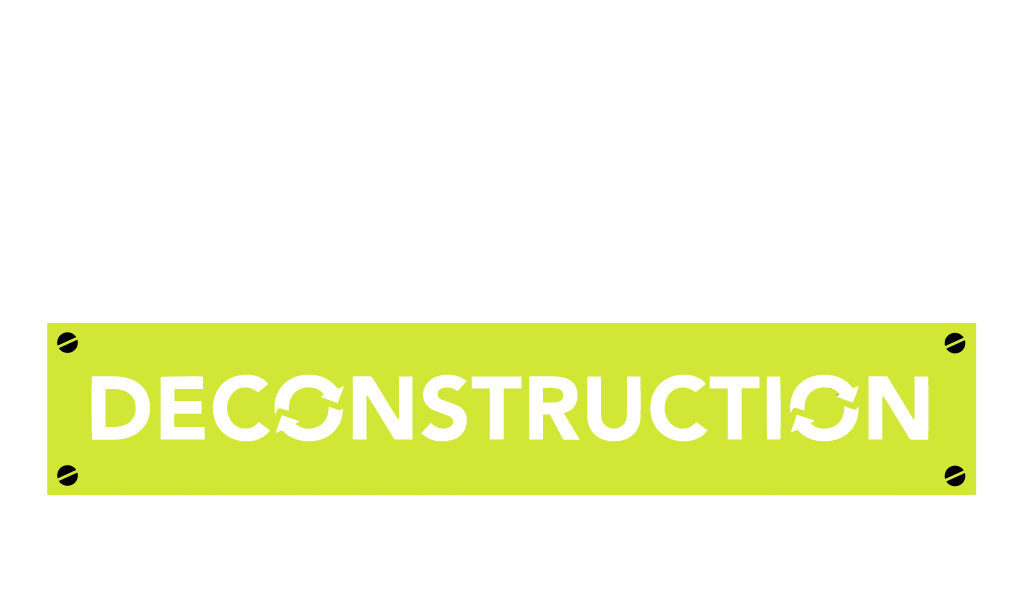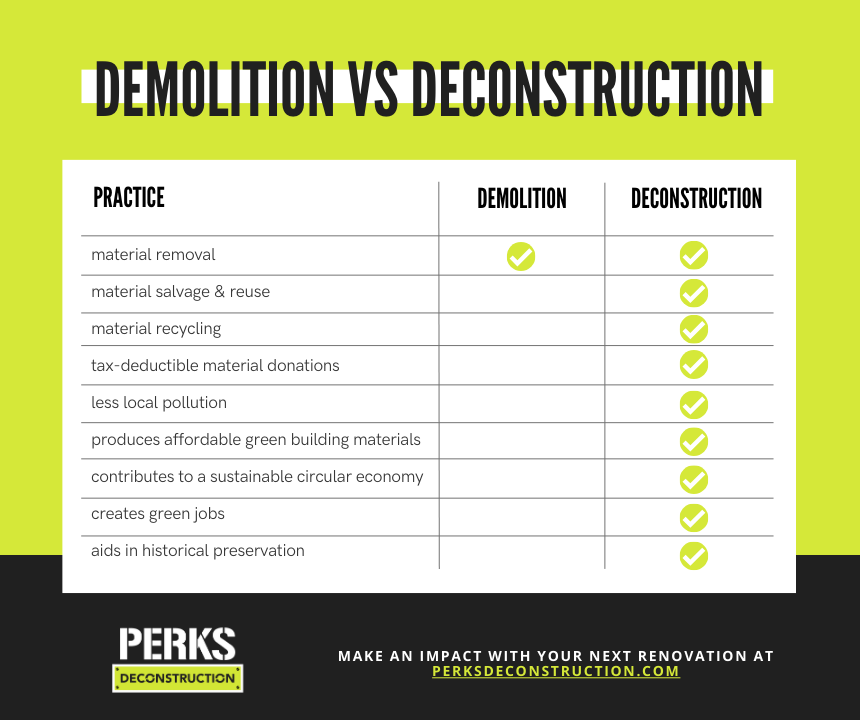Demolition vs deconstruction: What’s the difference?
A comparison of demolition and its sustainable alternative, deconstruction, as well as the many hidden benefits of deconstruction
If you're renovating your home or building a new one, chances are you’ve considered hiring a demolition contractor to remove old or unwanted structures. This involves using a wrecking ball, bulldozers, and other machinery to destroy and dump materials.
But did you know there is a more sustainable choice? It’s called deconstruction, and it achieves all the goals of demolition while prioritizing the salvaging and recycling of building materials.
Let’s dive into the difference between these two practices, as well as the many hidden benefits of choosing deconstruction.
Zooming out: Demolition waste in Colorado
We’ve all recycled products we use each day like cans and paper, but unfortunately, recycling demolition waste – a huge part of our waste stream – is not the norm: It’s estimated that one-quarter of Colorado landfills are made up of construction and demolition debris.
These wasted building materials are not only valuable — most of them can be reused or recycled. It’s estimated that upwards of 85% of materials in a home can be salvaged and reused or recycled. Materials like doors, windows, light fixtures, kitchen cabinets, bathroom fixtures, dimensional lumber, granite, flooring, and other materials can all be dismantled carefully and donated to a nonprofit for reuse. Materials like old wood with too many nails, brick and mortar, tiles, broken appliances and fixtures, scrap metal, and other materials can be collected for recycling. Learn more about the materials we salvage and what happens to them.
A sustainable alternative to demolition: Deconstruction
There is a process that takes into account the value of building materials during the demolition process: Deconstruction. The practice has become popular in recent years. In fact, the City of Denver, City of Boulder and the City of Lakewood have adopted policies that encourage salvaging and recycling building materials from certain construction and demolition projects. It’s always been our mission to help make deconstruction the norm in Colorado, and we’re excited to witness these developments and help Colorado homeowners and businesses adhere to these new rules to improve building material reuse and recycling rates. Contact us about your demolition project.
More about the benefits of deconstruction
Timing
While deconstruction practices are more methodical, that doesn’t mean demolition is always a faster process: It depends on the type of job. For example, a kitchen deconstruction project would take about the same amount of time as a kitchen demolition project. If we’re considering a house, deconstruction would likely take more time than demolition. that will take more time than a house demolition project.
Cost Savings
After building materials are disassembled and sorted for reuse and recycling, they are appraised by a third party for their value. (At Perks, we guide you through this process!) Any building materials that are salvaged from your job and donated to a nonprofit are considered tax-deductible write-offs that can help off-set the cost of your deconstruction job. Learn more and see a case study.
Impact on the economy and local communities
Demolition practices reflect a linear waste system, where virgin natural resources like timber are extracted, manufactured, consumed, and ultimately wasted at their end-of-life.
In contrast, deconstruction follows a Zero Waste System where unwanted materials are valued and salvaged for reuse or recycled. This creates a sustainable green building supply that prioritizes the highest and best use for all materials. Deconstruction supports a green, circular economy that lessens our dependence on natural resources, supports historical preservation, and provides low-cost green building materials to the community. Read more about deconstruction and circular economies on our blog.
Demolition and deconstruction facts:
One quarter of all the waste in Colorado landfills comes from construction and demolition waste (C&D) (Source: Recycle Colorado)
Demolition represented over 90 percent of total C&D debris generation in the U.S. in 2014, as opposed to construction, which represented under 10 percent. (Source: EPA)
1.17 jobs are created for every 1,000 tons of material that is recycled (Source: EPA)
600 million tons of C&D debris were generated in the United States in 2018, which is more than twice the amount of generated municipal solid waste (Source: EPA)
Demolition represents more than 90 percent of total C&D debris generation, while construction represents less than 10 percent (Source: EPA)
EPA's 2016 Recycling Economic Information (REI) Report showed that in 2012 the recycling of C&D materials created 175,000 jobs (Source: EPA)
Concerning construction and demolition waste (CDW), in the United States (US) alone, CDW amounted for 534 million tonnes (67%) of solid waste produced, whereas for the European Union (EU), 36% (924 million tonnes) was accumulated in 2016. (Source: Chen et al., 2021)
It’s in the name: We’re passionate about deconstruction!
We’re proud to be a mission-driven company that always has – and always will – put salvaging building materials first. In fact, our owner and founder, Anna Perks, founded this company on these sustainability principles after seeing a beautiful, historic house in Denver be demolished. She knew there was a better way. With a background in Zero Waste and an entrepreneurial spirit, Perks Deconstruction was eventually born as a way to sustainably salvage as many building materials from houses and commercial properties as possible. In addition, we run a Reclaimed Lumber Warehouse to provide low-cost sustainable building materials to the public and do our part to support the salvaged building material / reuse culture in and around Denver.
We are experts in the field of sustainable resource management and work with a network of community partners to help customers donate and salvage as many materials as possible. In addition to salvaging, we’re able to offer complete demolition services, including materials that can’t be salvaged, creating a one-stop experience. This, along with our friendly and professional staff and exceptional service, makes Perks Deconstruction a top choice for your demolition contractor needs. Give us a call today or fill out our form online to get in touch. We look forward to speaking with you!

